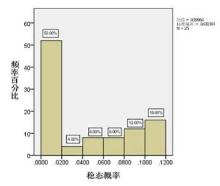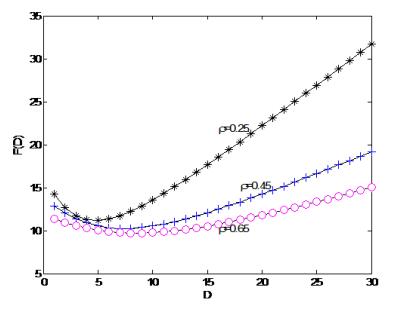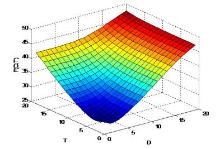Acta mathematica scientia,Series A ›› 2021, Vol. 41 ›› Issue (1): 269-288.
Analysis of M G D
- School of Mathematics and Software Science, Sichuan Normal University, Chengdu 610068
-
Received:2020-02-08Online:2021-02-26Published:2021-01-29 -
Contact:Yinghui Tang E-mail:tangyh@sicnu.edu.cn -
Supported by:the NSFC(71571127)
CLC Number:
- O213.2
Cite this article
Qionglin Liu,Yinghui Tang. Analysis of
share this article
"
| D | ρ = 0.25 | ρ = 0.45 | ρ = 0.65 | D | ρ = 0.25 | ρ = 0.45 | ρ = 0.65 |
| 1.0000 | 14.2233 | 12.832 | 11.3624 | 7.3471 | 11.8861 | 10.2411 | 9.7437 |
| 2.0000 | 12.6899 | 12.0542 | 10.9589 | 8.0000 | 11.7192 | 10.2460 | 9.7679 |
| 3.0000 | 11.7142 | 11.3958 | 10.5962 | 8.4000 | 12.4772 | 10.2945 | 9.7106 |
| 4.0000 | 11.2423 | 10.8906 | 10.2912 | 8.4100 | 12.5772 | 10.5945 | 9.7910 |
| 4.7490 | 11.1458 | 10.6144 | 10.1054 | 8.4200 | 12.4895 | 10.2964 | 9.7106 |
| 4.7491 | 10.6144 | 10.1054 | 8.4272 | 12.4939 | 10.2971 | 9.7106 | |
| 4.7492 | 11.1457 | 10.6143 | 10.1053 | 8.4273 | 12.4940 | 10.2971 | |
| 5.0000 | 11.1529 | 10.5405 | 10.0515 | 8.4300 | 12.4956 | 10.2974 | 9.7106 |
| 6.0000 | 11.3385 | 10.3320 | 9.8780 | 9.0000 | 12.2392 | 10.2629 | 9.7163 |
| 7.0000 | 11.7192 | 10.2460 | 9.7679 | 10.0000 | 12.8601 | 10.3652 | 9.7171 |
| 7.3400 | 11.8826 | 9.7441 | 12.0000 | 15.0976 | 11.0448 | 9.9767 | |
| 7.3466 | 11.8859 | 10.2411 | 9.7437 | 14.0000 | 16.7732 | 11.7094 | 10.3131 |
| 7.3467 | 11.8860 | 10.2411 | 9.7437 | 16.0000 | 18.5315 | 12.4821 | 10.7427 |
| 7.3469 | 11.8861 | 10.2411 | 9.7437 | 18.0000 | 20.3446 | 13.3305 | 11.2423 |
| 7.3470 | 11.8861 | 10.2411 | 9.7437 | 18.1110 | 20.5315 | 13.4821 | 11.7427 |
| 1 |
Doshi B . Queueing systems with vacations:a survey. Queueing Systems, 1986, 1: 29- 66
doi: 10.1007/BF01149327 |
| 2 | 田乃硕. 休假随机服务系统. 北京: 北京大学出版社, 2001 |
| Tian N S . Stochastic Service System with Vacations. Beijing: Peking University Press, 2001 | |
| 3 | 唐应辉, 唐小我. 排队论-基础与分析技术. 北京: 科学出版社, 2006 |
| Tang Y H , Tang X W . Queueing Theory-Foundations and Analysis Techniques. Beijing: Science Press, 2006 | |
| 4 | 骆川义, 唐应辉. 具有可变到达率的多重休假Geoλ1,λ2/G/1排队分析. 数学学报, 2010, 53 (4): 805- 816 |
| Luo C Y , Tang Y H . Analysis of a multi-vacation Geoλ1,λ2/G/1 queue with variable arrival rate. Acta Mathematica Sinica, 2010, 53 (4): 805- 816 | |
| 5 |
Luo C Y , Xiang X L , Yu M M , Tang Y H . Recursive solution of queue length distribution for Geo/G/1 queue with single server vacation and variable input rate. Computers and Mathematics with Applications, 2011, 61 (9): 2401- 2411
doi: 10.1016/j.camwa.2011.02.018 |
| 6 | 余妙妙, 唐应辉, 付永红. 具有中途准入机制和多重休假的离散时间GI/Geom(a,b)/1/N早到达排队系统. 应用数学学报, 2011, 34 (5): 853- 872 |
| Yu M M , Tang Y H , Fu Y H . GI/Geom(a,b)/1/N early queueing system with accessible mechanism of ongoing service and multiple vacation. Acta Mathematicae Applicatae Sinica, 2011, 34 (5): 853- 872 | |
| 7 |
Luo C Y , Tang Y H . The recursive solution for Geom/G/1(E,SV) queue with feedback and single server vacation. Acta Mathematicae Applicatae Sinica, 2011, 27 (1): 155- 166
doi: 10.1007/s10255-011-0049-y |
| 8 | Wei Y Y , Yu M M , Tang Y H , Gu J X . Queue size distribution and capacity optimum design for N-policy Geo(λ1,λ2,λ3)/G/1 queue with setup time and variable input rate. Mathematical and Computer Modelling, 2013, 57 (5/6): 1559- 1571 |
| 9 | 唐应辉, 吴文青, 刘云颇. 基于单重休假的Min(N,V) -策略M/G/1排队系统分析. 应用数学学报, 2014, 37 (6): 976- 996 |
| Tang Y H , Wu W Q , Liu Y P . Analysis of M/G/1 queueing system with Min(N,V)-policy based on single server vacation. Acta Mathematicae Applicatae Sinica, 2014, 37 (6): 976- 996 | |
| 10 | 贺灵悦, 唐应辉. 带启动时间和多重休假的Min(N,V) -策略M/G/1排队系统. 系统科学与数学, 2017, 37 (3): 864- 862 |
| He L Y , Tang Y H . M/G/1 queueing system with set-up time and Min(N,V)-policy based on multiple server vacations. Journal of Systems Science and Mathematical Sciences, 2017, 37 (3): 864- 862 | |
| 11 | 蒋书丽, 唐应辉. 具有多级适应性休假和Min(N,V) -策略控制的M/G/1排队系统. 系统科学与数学, 2017, 37 (8): 1866- 1884 |
| Jang S L , Tang Y H . M/G/1 queueing system with multiple adaptive vacations and Min(N,V)-policy. Journal of Systems Science and Mathematical Sciences, 2017, 37 (8): 1866- 1884 | |
| 12 | 蔡晓丽, 唐应辉. 具有温储备失效特征和单重休假Min(N,V) -控制策略的M/G/1可修排队系统. 应用数学学报, 2017, 40 (5): 692- 701 |
| Cai X L , Tang Y H . M/G/1 repairable queueing system with warm standby failure and Min(N,V)-policy based on single vacation. Acta Mathematicae Applicatae Sinica, 2017, 40 (5): 692- 701 | |
| 13 | Balachandran K R , Tijms H C . On the D-policy for the M/G/1 queue. Management Science, 1975, 21 (9): 1073- 1076 |
| 14 |
Artalejo J R . On the queue with D-policy. Applied Mathematical Modelling, 2001, 25 (12): 1055- 1069
doi: 10.1016/S0307-904X(01)00031-2 |
| 15 |
Lee H W , Beak J W . Analysis of the M.X/G/1 queue under D-policy. Stochastic Analysis and Applications, 2005, 23 (4): 785- 808
doi: 10.1081/SAP-200064479 |
| 16 |
魏瑛源, 唐应辉, 顾建雄. 延迟D -策略Geo/G/1排队系统队长分布及容量的优化设计. 系统工程理论与实践, 2013, 33 (4): 996- 1005
doi: 10.3969/j.issn.1000-6788.2013.04.022 |
|
Wei Y Y , Tang Y H , Gu J X . Queue size distribution and capacity optimum design for Geo/G/1 queueing system with delayed D -policy. Systems Engineering:Theory and Practice, 2013, 33 (4): 996- 1005
doi: 10.3969/j.issn.1000-6788.2013.04.022 |
|
| 17 | 魏瑛源, 唐应辉, 余妙妙. 基于Min(N,D) -策略的M/G/1排队系统的队长分布及最优策略. 系统科学与数学, 2015, 35 (6): 729- 744 |
| Wei Y Y , Tang Y H , Yu M M . Queue length distribution and optimum policy for M/G/1 queueing system under Min(N,D)-policy. Journal of Systems Science and Mathematical Sciences, 2015, 35 (6): 729- 744 | |
| 18 |
Gu J X , Wei Y Y , Tang Y H , Yu M M . Queue size distribution of Geo/G/1 queue under the Min(N,D)-policy. Journal of Systems Science and Complexity, 2016, 29 (3): 752- 771
doi: 10.1007/s11424-016-4180-y |
| 19 | 兰绍军, 唐应辉. 具有Bernoulli反馈和Min(N,D) -策略控制的Geo|(λ1,λ2)/G/1离散时间可修排队的可靠性分析. 系统科学与数学, 2016, 36 (11): 2070- 2086 |
| Lan S J , Tang Y H . Reliability analysis of Geo|(λ1,λ2)/G/1 discrete-time repairable queue with Bernoulli feedback and Min(N,D)-policy. Journal of Systems Science and Mathematical Sciences, 2016, 36 (11): 2070- 2086 | |
| 20 |
Lan S J , Tang Y H . Analysis of D-policy discrete-time Geo/G/1 queue with second J-optional service and unreliable server. RAIRO-Operations Research, 2017, 51 (1): 101- 122
doi: 10.1051/ro/2016006 |
| 21 |
高丽君, 唐应辉. 具有Min(N,D) -策略控制的M/G/1可修排队系统及最优控制策略. 数学物理学报, 2017, 37A (2): 352- 365
doi: 10.3969/j.issn.1003-3998.2017.02.014 |
|
Gao L J , Tang Y H . M/G/1 repairable queueing system and optimal control policy with Min(N,D)-policy. Acta Mathematica Scientia, 2017, 37A (2): 352- 365
doi: 10.3969/j.issn.1003-3998.2017.02.014 |
|
| 22 |
潘取玉, 唐应辉. 在延迟Min(N,D) -控制策略下修理设备可更换的M/G/1可修排队系统及最优控制策略. 数学物理学报, 2018, 38A (5): 1014- 1031
doi: 10.3969/j.issn.1003-3998.2018.05.017 |
|
Pan Q Y , Tang Y H . Analysis of M/G/1 repairable queueing system and optimal control policy with a replaceable repair facility under delay Min(N,D)-policy. Acta Mathematica Scientia, 2018, 38A (5): 1014- 1031
doi: 10.3969/j.issn.1003-3998.2018.05.017 |
|
| 23 | 王敏, 唐应辉. 基于Min(N,D,V) -策略和单重休假的M/G/1排队系统的最优控制策略. 系统科学与数学, 2018, 38 (9): 1067- 1084 |
| Wang M , Tang Y H . Optimal control policy of M/G/1 queueing system based on Min(N,D,V)-policy and single server vacation. Journal of Systems Science and Mathematical Sciences, 2018, 38 (9): 1067- 1084 | |
| 24 | 罗乐, 唐应辉. 具有Min(N,D,V) -策略控制的M/G/1排队系统. 运筹学学报, 2019, 23 (2): 1- 16 |
| Luo L , Tang Y H . M/G/1 queueing system with Min(N,D,V)-policy Control. Operations Research Transactions, 2019, 23 (2): 1- 16 | |
| 25 | Liu R B , Alfa A S , Yu M M . Analysis of an ND-policy Geo/G/1 queue and its application to wireless sensor networks. Operational Research:An International Journal, 2019, 19 (2): 449- 477 |
| 26 |
Lee H W , Seo W J , Lee S W , et al. Analysis of the MAP/G/1 queue under the Min(N,D)-policy. Stochastic Models, 2010, 26 (1): 98- 123
doi: 10.1080/15326340903517121 |
| 27 |
Lee H W , Seo W J , Lee S W . Analysis of the M/G/1 queueing system under the triadic(N,D,T)-policies. Quality Technology and Quantitative Management, 2011, 8 (3): 333- 357
doi: 10.1080/16843703.2011.11673262 |
| [1] | Le Luo,Yinghui Tang. System Capacity Optimization Design and Optimal Control Policy (N*, D*) for M/G/1 Queue with p-Entering Discipline and Min(N, D, V)-Policy [J]. Acta mathematica scientia,Series A, 2019, 39(5): 1228-1246. |
| [2] | Quyu Pan,Yinghui Tang. Analysis of M/G/1 Repairable Queueing System and Optimal Control Policy with a Replaceable Repair Facility Under Delay Min(N, D)-Policy [J]. Acta mathematica scientia,Series A, 2018, 38(5): 1014-1031. |
| [3] | Gao Lijun, Tang Yinghui. M/G/1 Repairable Queueing System and Optimal Control Policy with Min(N,D)-Policy [J]. Acta mathematica scientia,Series A, 2017, 37(2): 352-365. |
|
















